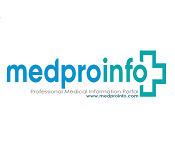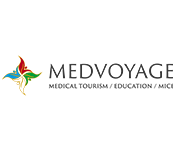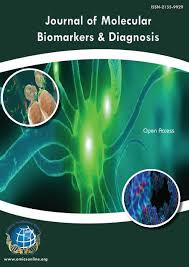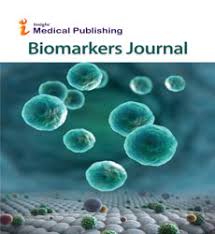Theme: Awareness and Innovations in Biomarkers & Clinical Research in the Present Era of COVID- 19 Outbreak
Biomarkers Congress 2020
Dear Potential Researchers, Scientists, Industrialists & Students,
Join us for 2nd International Conference on Biomarkers and Cell Biology
During the period of travel restrictions and lockdown, why waste your time?
Update your skills, Meet your academic heroes, Engage in high-level debates Refine your ideas, Enhance your knowledge base, and Broaden your horizons, Visit a new place and have fun!
Email: biomarkers@memeetings.com
Call: 1-201-380-5561
WhatsApp: +44 7723584563
Theme: Awareness and Innovations in Biomarkers & Cell Biology in the present Era of COVID - 19 Outbreak
Biomarkers Conference 2020 gives an essential gathering for the exchange of thoughts and inventive ideas in all regions related to biomarkers. Biomarkers Congress 2020 intends to unite leading scientists, researchers, and research scholars to share their experiences and research results on all domains of Biomarkers and Cell Biology. It likewise invites clinical trials and statistical studies and methodologically sound literature reviews. Biomarkers Congress 2020 will give a dynamic and amazing way to deal with the spectrum of diseases with clear applications in disease prevention, analysis, and disease transmission. The meeting program acknowledges the wide scope of difficulties and issues in the field of biomarkers and cell Biology that will be addressed through keynote speakers, plenary speakers, eminent professors, and medical professionals, along with poster sessions.
This Conference is accredited by the Continuing Professional Development (CPD) credits. Continuing Professional Development keeps you up so far on current and emerging developments.
International Conference on Biomarkers and Clinical Research conference is organized by ME Conferences which comprises of 3000+ international Events with over 2000+ Conferences, 1200+ Symposiums and Workshops on multiple fields of Clinical, Therapeutic, Pharmaceutical, Engineering, Science, Technology, and Business.
We are anticipating a moving two-day research event, business meeting, and exhibition.
Why to Attend Biomarkers Congress 2020?
- Categorizing innovations based on research and practice to optimize clinical research and development of biomarkers.
- To promote opportunities to network, collaborate and exchange ideas with world-renowned Biomarkers research leaders.
- Recognizing opportunities for evidence-based training to improve research and development of Biomarkers.
- To discuss and debate the challenges and prospects in the new era of optimizing reforms in clinical research and development.
- Dispute discrepancies and sustainable development goals in improving research and development of Biomarkers.
Benefits of joining webinar
- Reduced costs and affordability
- Access to all sessions online
- Make new connections
- Get your abstracts published with DOI
- Get certified for your participation
- Global exposure of your research
- Increased engagement
- Develop your business
- Monitor your competitors activities
- Cost effectiveness
- Significant time saving
- Convenience
Guidelines for presenters
- Each presenter will have 20-25 minutes for their presentation.
- Plan your talk for 15 minutes to allow for introduction and Q&A sessions at the end of your talk.
- Ensure that you start and end your presentation on the times indicated in the program.
- Language preference- English
Target Audience of Biomarkers Congress 2020
- Biomarker associations
- Biomedical industrials
- Business entrepreneurs
- Cancer researchers
- Cardiologists
- Cell Biologists
- Clinical researchers
- Diagnostic experts
- Geneticists
- Immunologists
- Medical counsellors
- Medical devices specialists
- Molecular biologists
- Neurologists
- Oncologists
- Pathologists
- Pharmacologists
- Radiologists
- Stem Cell Researchers
- Students
- Young researchers
TRACK 1: Clinical Biomarkers
Clinical biomarkers are biological markers used for conducting clinical trials. They are an important and powerful tool for understanding the nature, epidemiology, random clinical trials, drug screening, or diagnosis and prognosis of the disease. Clinical biomarkers detect the changes in cell or body fluid constituents and offer a means for standardized classification of a disease and risk factors that can extend the basic information on the underlying bacterial pathogenesis of diseases. This shortens the period of clinical trials and involves fewer patients, with clearer endpoints and results that are easy to interpret. The major medical biomarker research is conducted in the fields of drug discovery, pharmacogenomics, oncology, and diagnosis of disease.
TRACK 2: Translational and Tissue Biomarkers
Translational biomarkers are used to identify a compound’s effect on organs or tissues before a clinical effect is noticeable. Choosing the appropriate translational biomarker is grounded on the fact that it should be detectable, measurable and, able to be qualified or validated. Next Generation Sequencing is a prominent way nowadays to produce new biomarkers for disease diagnosis such as celiac disease diagnosis. Tissue biomarkers are used for screening or diagnosis that often represent surrogate manifestations of the disease. These helps in the measurement of a biologically effective dose that generally indicates the amount of toxin or chemical measured in the target tissue or organ.
TRACK 3: Immuno-Oncology Biomarkers
These biomarkers are associated with the immunological factor of oncology research. These help in stimulating the immune system artificially to treat cancer by improving the body’s natural ability to fight the disease, given the fact that cancer cells often have tumor antigens on their surface that can be detected by the antibodies of the immune system by binding to them. Therapies related to immuno-oncology are commonly associated with delayed clinical benefit and durable responses, as seen multiple myeloma (MM).
TRACK 4: Biomarkers and Personalized Medicine
Personalized medicine is a progressive research field due to limitations of standard diagnosis and treatment. Personalized medicine has its underlying benefits in the clinical molecular testing of biomarkers, under the classification of: prognostic, predictive, pharmacodynamics or diagnostic. Personalized Medicine is progressively being utilized across numerous zones of clinical practice, as genes related to specific diseases are found and targeted treatments are created.
TRACK 5: Biomarkers and Genomic Medicine
Genomic medicine is an interdisciplinary medical specialty involving the use of genomic information to produce patient specific medications. Genomic medication as "a rising medical discipline that involves victimization genomic information regarding a private as an area of their clinical care (e.g., for diagnostic or therapeutic decision-making) molecular studies.
TRACK 6: Cell Biology and Molecular Biology
Molecular biology involves the molecular basis of activity between various systems of a cell, including interactions between different types of DNA, RNA and proteins, their biosynthesis, and studies how these interactions are regulated. Molecular biology has its applications in gene finding, molecular mechanisms of diseases progression and its therapeutic approaches by cloning, expression and regulation of gene. Research area includes gene expression, epigenetics and chromatin structure and function, RNA processing, functions of non-coding RNAs, transcription and transcriptomics.
TRACK 7: Gene and Cell Based Therapies: Stem cell and Beyond
Gene therapy is a technique that uses genes as a basis for disease treatment. In the future, this system may allow doctors to treat a disorder by inserting a gene into a patient’s cells rather than using drugs or surgery. Researchers are currently testing several approaches for gene therapy. Gene therapy is an encouraging treatment option for a various number of diseases that has inherited disorders, some sorts of cancer, and certain viral infections, the technique is risky and under study to make sure it’s safe and effective for real-world use.
TRACK 8: The Emerging Role of Microbiome in Diagnostics
Microbiome research has started to shift its view toward different types of applications of the microbiota. In the present time, we know certain microorganisms are essential for our health, whereas some species are responsible for infections and all sorts of diseases such as inflammatory bowel disease or type-2 diabetes. Some microorganisms are known to be ineffective against cancer drugs, while others are strictly necessary to make these drugs work. Amass of all microbiota that are found on or within human tissues and biofluids along with the anatomical sites is known as the Human Microbiome.
TRACK 9: Future Trends in Drug Discovery Technology
Drug discovery is the process by which new medications are formulated using different methodologies form different substrates. Modern-day drug formulation includes the identification of screening hits, medicinal chemistry of the compound and optimization of these hits to extend the affinity, selectivity (to reduce potential side effects), metabolic stability (increasing the half-life), and its oral bioavailability.
TRACK 10: Biomarkers for Patient Selection
Biomarkers for patient selection can extensively increase rehabilitation trial sensitivity and efficiency, with a decrease in costs and time required for completion. Biomarker development integration within the early-stage development of novel agents testing might furnish clinically relevant therapeutic opportunities for individuals with advanced-stage cancer and also stimulate the drug approval procedure. Patient selections for a therapeutic trial are often inconsistent. The selection criteria should have as few risks as possible for the patients.
TRACK 11: Cell Physiology in Health and Disease
Cell Physiology is the study of all the activities that take place inside a cell. It includes all the crucial activities such as cell signaling, biomolecules synthesis, and transportation. Cell physiology plays a crucial role in cellular health that in turns plays a role in the individual’s health. Cell health assays are methods used to detect candidate’s small molecules for inspecting the cellular toxicity of the individual. Cellular physiology plays an important role in elucidating the molecular basis of human disease that can help discover new drugs for that particular disease.
TRACK 12: Cellular Chemotherapy and Cell Replacement Therapy
Chemotherapy is a form of a cancer treatment strategy that uses one or more anti-cancerous medications as part of a standardized chemotherapy procedure. Chemotherapy may be given with a curative intent (which almost always involves combinations of drugs), or it may aim to lengthen life or to reduce symptoms. Cell Replacement therapy is a method of injection, implantation or replacement of cells or tissues that are either non-functioning or may lead to autoimmunity using stem cell (as a replacement).CRT is a promising strategy for the treatment of non-cancerous diseases such as neurodegenerative diseases, cardiovascular diseases, and other diseases.
TRACK 13: Microbial Biochemistry and Molecular Immunology
Microbial biochemistry constitutes all the biochemical reactions within a microbe, its growth, modes, and mechanism of pathogenesis. It also incorporates the study of microbial cell structure, microbial metabolism, and advanced functions. The biochemical study of microbes is crucial for detecting their action. When monomers are co-linked to synthesize a polymer, dehydration occurs often resulting in the assembly of different macromolecules in a much larger complex. Molecular immunology concentrates on the molecular level diagnosis and analysis of the immune system.
TRACK 14: Cell Damage and Adaptation
Cellular adaptation attribute to changes made by a cell in response to adverse or varying environmental changes. The adaptation may be physiological or pathological. There are two types of patterns displayed by an injured cell: 1) Reversible cell injury that leads to cellular adaptation, 2) Irreversible cell injury that leads to cell death and tissue damage. When cells adapt to injury, their adaptive changes can be any of the five types: atrophy, hypertrophy, hyperplasia, dysplasia, or metaplasia and they may also accumulate fat, cholesterol, protein, glycogen, or pigment. When cells are irreversibly injured or dying, specific nuclear changes may be seen such as pyknosis, karyorrhexis, and karyolysis. If large numbers of cells die, tissue may follow necrosis.
TRACK 15: Cellular Plasticity and Reprogramming
Cell plasticity is the ability to assume different cellular phenotypes interchangeably that has widely been studied in the context of development, and wound repair. The transformation between cellular phenotypes is often regulated by environmental clues triggered during stress, promoting a mesenchymal state to aid in cell survival and tissue repair. Cellular plasticity underlines regeneration regardless of the source of the regenerative cells. Cell reprogramming refers to the process of reverting mature, specialised cells into induced pluripotent stem cells. Cell Reprogramming also refers to the deletion and re-establishment of epigenetic marks during mammalian germ cell development.
Scope and Importance
In the subsections of representative diseases, the biomarker market presents the highest of all prospects. This study looks at one of the market's most important engines: Overview of the combination analyses, which are estimated to continue to make a significant contribution to market innovations during the forecast period. This report analyzes emerging markets in the disease segment. Endless growth is estimated in emerging geographies, driven by the growing middle class in emerging countries like India, China, Brazil, and Russia. It is important to stress that the ability to integrate an effective strategy begins with the place where the opportunity exists and ends with the way in which it can be effectively implemented in order to reap the benefits of the opportunity.
Global Market Analysis of Biomarkers and Cell Biology
In 2018, the global market for biomarkers stood at USD 41.2 billion and is expected to generate around USD 108.4 billion by 2025, with a CAGR of around 14.8% between 2019 and 2025.
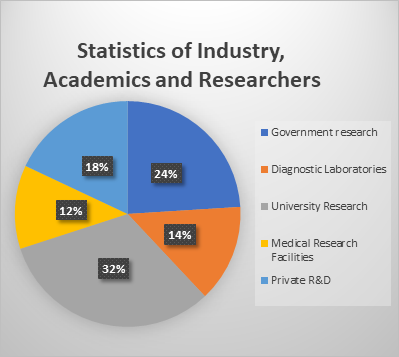
According to industrial, academic and reseachers statistics university reseachers takes the first position with 32%, government research takes the second position with 24%, where research and development takes third position with 18% and diagnostic laboratories, medical research facilities takes fourth and fifth places with 14% and 12% respectively.
The Biomarkers Market is segmented on the lines of Product Segment Analysis (Consumable, Services, and Software), Type Analysis (Safety biomarker, Efficacy biomarker, and Validation biomarker), Application Analysis (Diagnostics development, Drug discovery development, Personalized medicine and Disease risk assessment ), Disease Indication Analysis (Cancer & Cardiovascular disorders, Neurological disorders, and Immunological disorders) and Regional Analysis (North America, Europe, Asia-Pacific and Rest of the World)
The main driving factors for the biomarkers market are: 1) Increase in the number of low cost for conducting clinical trials in developing countries & 2) Rising healthcare expenditure and R&D funding are the major drivers of the market. 3) The proliferation of sequencing methodologies, notably Next Generation Sequencing (NGS), due to the rising cost of sequencing and development of the Human Genome Project in the field of genomics is expected to drive the market.
There are some restrictions related to biomarkers such as 1) It contains technical issues related to sample and storage & 2) The testing cost of biomarkers is high and it requires high investment but a relatively low cost to benefit ratio.
The biomarkers market includes personalized medicine, diagnosis, discovery, and development of drugs, and others based on the applications. Drug discovery and development accounted for a significant market share in 2018.
Biomarkers market size in Asia-Pacific is predicted to reach USD 12.15 Billion by 2024.The size of the biomarkers market in the Middle-East and Africa region is expected to grow at a CAGR of 15.295% and is estimated to reach USD 6.92 Billion by 2024. In the upcoming years, the Asia Pacific region is expected to record high growth in the global biomarker industry. China, Japan, and India are expected to be major contributors to the Asia Pacific biomarkers market in the future. The favorable environment for clinical trials in the Asia Pacific is likely to fuel the biomarkers market over the forecast period.
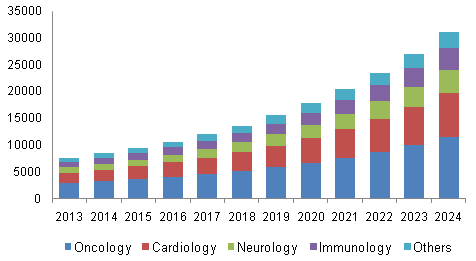
The cellular analysis market for cell biology tools and reagents globally reached $48.2 billion in 2016. The market should reach $58.0 billion by 2020, growing at a Compound Annual Growth rate (CAGR) of 3.8% from 2015 to 2020. The tools and reagents covered in reports are used for researching the domains of genomics and cell (DNA and RNA research), proteomics, cell biology research, epigenetics, metabolomics, bioinformatics, microscopy and imaging, and stem cell research. Also included are the markets of recombinant animal models, antibodies and proteins.
Gene Therapies play a role in the cell biology market. The decreasing cost of Genome Sequencing and advancements in cell biology sector has led to an increase the market capitalization and is also helping in growing the overall market.
The global market size for personalized medicine was estimated at USD 1.57 trillion in 2018 and is foreseen to expand at a CAGR of 10.6 %. It promises a paradigm shift in diagnosis and care delivery as the treatment is based on data leveraged from a holistic view of an individual patient. The proliferation of sequencing methodologies, especially Next Generation Sequencing (NGS), due to the rising cost of sequencing and development of the Human Genome Project in the genomics field is expected to drive the market.
BIOMARKERS MARKET IS ESTIMATED TO BE VALUED AT USD 78.2 BILLION BY 2024
Biomarkers have quite a large market share and it includes companies such as F. Hoffmann-La Roche Ltd.; Abbott; Agilent Technologies, Inc.; Epigenomics AG; Johnson & Johnson Services, Inc.; Thermo Fisher Scientific, Inc.; Bio-Rad Laboratories, Inc.; Siemens Healthcare Private Limited; and Qiagen.
Market Share of Personalized Medicine is huge comprising of key companies such as Abbott Laboratories; GE Healthcare; Illumina, Inc. Asuragen, Inc.; Dako A/S; deCODE Genetics; Genelex Corporation; Exagen Diagnostics, Inc.; Precision Biologics, Inc.; QIAGEN; Biogen, Inc. Exogen Biotechnology; Genome Medical; DoseMe, etc. The above companies are carrying out strategic developments for launching novel personalized products, which will also contribute to the expansion of the whole Biotechnology market.
Why Biomarkers Conference 2020 in Dubai?
Biomarkers Conference 2020 will be held in Dubai. Dubai is a global city and a business (commercial) hub for the Middle East. It is also a major global transport hub for passengers and cargo. Oil revenues helped increase the development of the city, which was already a major commercial hub. Today, less than 5% of the Emirate's revenue comes from oil. As a center for regional and international trade since the early twentieth century, Dubai's economy relies on revenues from trade, tourism, aviation, real estate and financial services. Dubai is definitely a 21st century destination, any article about the fastest growing city in the region and it's almost guaranteed you'll see the words‘ ambitious',‘ record-breaking’ and‘ staggering'. This meteoric rise has not gone unnoticed, and each year thousands of expats arrive to demand a slice of the action.
Top Major Societies Associated with Biomarkers and Cell Biology
American Society for Biochemistry and Molecular Biology
American Society of Gene and Cell Therapy (ASGCT)
Australasian Gene Therapy Society (AGTS)
Austrian Network for Gene Therapy
Biomarkers Profile Corporation
British Society for Cell Biology
British Society and Gene and Cell Therapy
California Institute for Regenerative Medicine
Dutch Society for Cell Biology
EMBO
Engineering in Medicine and Biology Society
European Society of Gene and Cell Therapy (ESGCT)
European society of Molecular Imaging
Indian Society of Cell Biology
International Federation for Cell Biology
International society for Oncology and Biomarkers
International Society for Stem Cell Research
International Society of Oncology and Biomarkers
International Society of Personalized Medicine
New York Stem Cell Foundation
Society of Nuclear Medicine and Molecular Imaging
The ALS Association
The American Society for Cell Biology
The Boston Society
The Society for Molecular Biology & Evolution
World Molecular Imaging Society
Conference Highlights
- Clinical Biomarkers
- Translational and Tissue Biomarkers
- Immuno-Oncology Biomarkers
- Biomarkers and Personalized Medicine
- Biomarkers and Genomic Medicine
- Cell Biology and Molecular Biology
- Gene and Cell Based Therapies: Stem Cell and Beyond
- The Emerging Role of Microbiome in Diagnostics
- Future Trends in Drug Discovery Technology
- Biomarkers for Patient Selection
- Cell Physiology in Health and Disease
- Cellular Chemotherapy and Cell Replacement Therapy
- Microbial Biochemistry and Molecular Immunology
- Cell Damage and Adaptation
- Cellular Plasticity and Reprogramming
To share your views and research, please click here to register for the Conference.
To Collaborate Scientific Professionals around the World
| Conference Date | June 15-16, 2020 | ||
| Sponsors & Exhibitors |
|
||
| Speaker Opportunity Closed | |||
| Poster Opportunity Closed | Click Here to View | ||
Useful Links
Special Issues
All accepted abstracts will be published in respective Our International Journals.
Abstracts will be provided with Digital Object Identifier by








